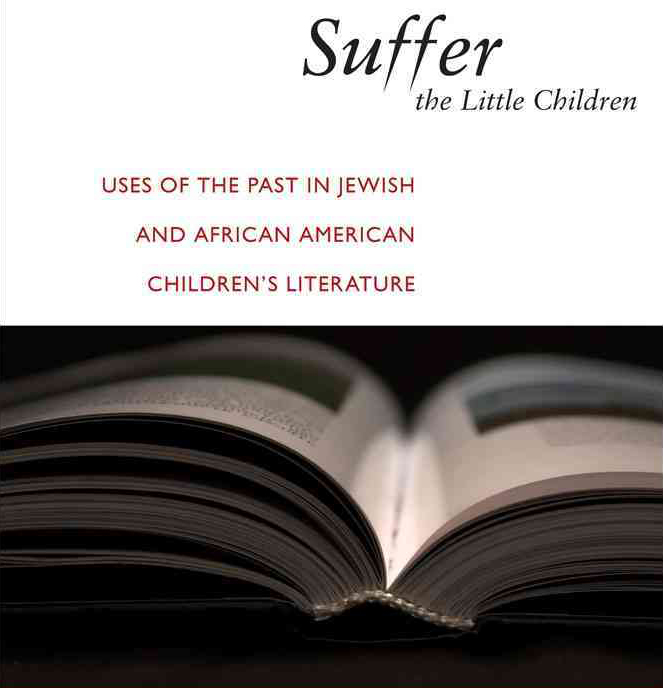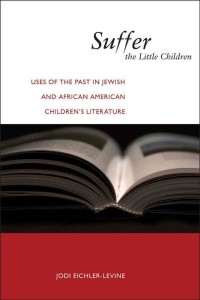As many Americans cling to the prospect of a post-racial society in the wake of its first African American president, children growing up in the United States may find they are unable to fully comprehend the significance of this political milestone. For young Americans today, an unburdened, limitless, and diverse reality is all they’ve ever known. But identities are complexly crafted from a variety of different sources, and many children’s understanding of their position in America will start with the books they read.
In Suffer the Little Children: Uses of the Past in Jewish and African American Children’s Literature, Jodi Eichler-Levine, an Assistant Professor of Religious Studies at the University of Wisconsin Oshkosh, warns us that “books for tots are anything but innocent.” She takes a fair and scholarly approach to the way Jewish and African American stories transmit core cultural beliefs to the children and adults who read them, and opens a dialogue about America’s complicated — and often brutal — history of racial, ethnic, and religious oppression.
But what is the cost of passing on tales of Jewish and African American sacrifice and suffering that are whitewashed or inaccurate?
A chronological look at Jewish and African American children’s literature shows that cultural assimilation became synonymous with patriotism. From the American Revolution to 9/11, minorities have had to align themselves with a largely white, Protestant American population in order to distance themselves from a perceived enemy. One way this was achieved was by writing children’s books about Jewish and African Americans that minimize their cultural differences to white, Protestant Americans. This cultural downplaying stripped away anything that might portray a black or Jewish child as “too ethnic” by watering down Judaism or reimaging black stereotypes as comical and, therefore, non-threatening.
Children’s books are often the way white Americans are introduced to Jewish and African American history and culture. This is problematic because, while a black or Jewish family may have family or oral histories to add dimensions to the readings, most white children must rely only on what a story conveys. Eichler-Levine makes it clear that all children are in danger of absorbing messages about minority groups that are manipulative and sometimes downright false.
For example, in Crispus Attucks: Boy of Valor (1965), Dharathula Millender attempts to make African Americans a part of the founding narrative of the United States by portraying Attucks as a patriot. While the goal is commendable, how it is achieved is troubling.
Many historians believe that Crispus Attucks, an ex-slave, was the first person killed during the Boston Massacre in 1770. This event is widely viewed to have prompted the American War of Independence five years later. However, as Eichler-Levine points out, little is known about the circumstances of Attucks’ life and death. His entire childhood is imagined by Millender in order to create a story that will appeal to and reinforce national pride in young readers. Creating a fictional childhood for an American hero isn’t new, but in this case it is done to portray Attucks as a martyr who is willing to die for his country’s freedom.
Millender’s biography isn’t the only book about Attucks to emphasize his supposed patriotic motives. In The Cost of Freedom: Crispus Attucks and the Boston Massacre (2004), Joanne Mattern invents dialog where Attucks says he fought for American liberty because he had been a slave: “I was a slave long ago, Matt. It is a bad life. Now it seems the colonists are slaves to the British. This can’t go on. People need to be free.”
While it may be clear to an adult that this dialog is make-believe, a child might understand it to be an authentic part of history. Without addressing the reality that many blacks fought for their own freedom rather than the freedom of the country, stories like Mattern’s not only gloss over the history of American slavery, but also of African American resistance.
Suffer the Little Children is an incredible resource for teachers, historians, and writers of children’s stories who want to correct the distortion of Jewish and African American histories in the stories for a new generation. The best way for a child to understand and welcome a mix of cultures and religions isn’t by promoting their erasure through assimilation, but by creating a society where diversity is embraced. In a society that favors acceptance, we have a better chance of moving toward a country that truly values liberty and justice for all.
Sakena Patterson is a freelance writer based in her hometown of Pittsburgh, Pennsylvania. She returned to Pittsburgh after a seven-year spree in Los Angeles, where she earned an MFA in fiction from Antioch University. Twitter: @misspatterson Tumblr: sakpatt.tumblr.com
- Follow us on Twitter: @inthefray
- Comment on stories or like us on Facebook
- Subscribe to our free email newsletter
- Send us your writing, photography, or artwork
- Republish our Creative Commons-licensed content


